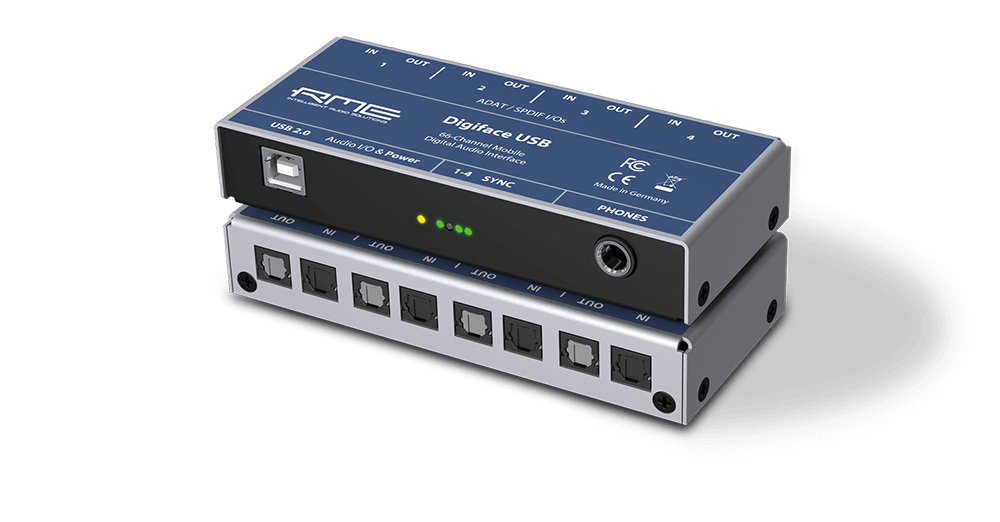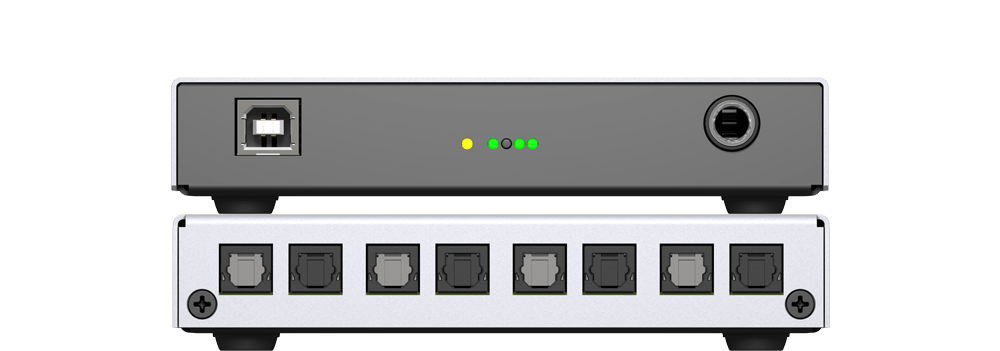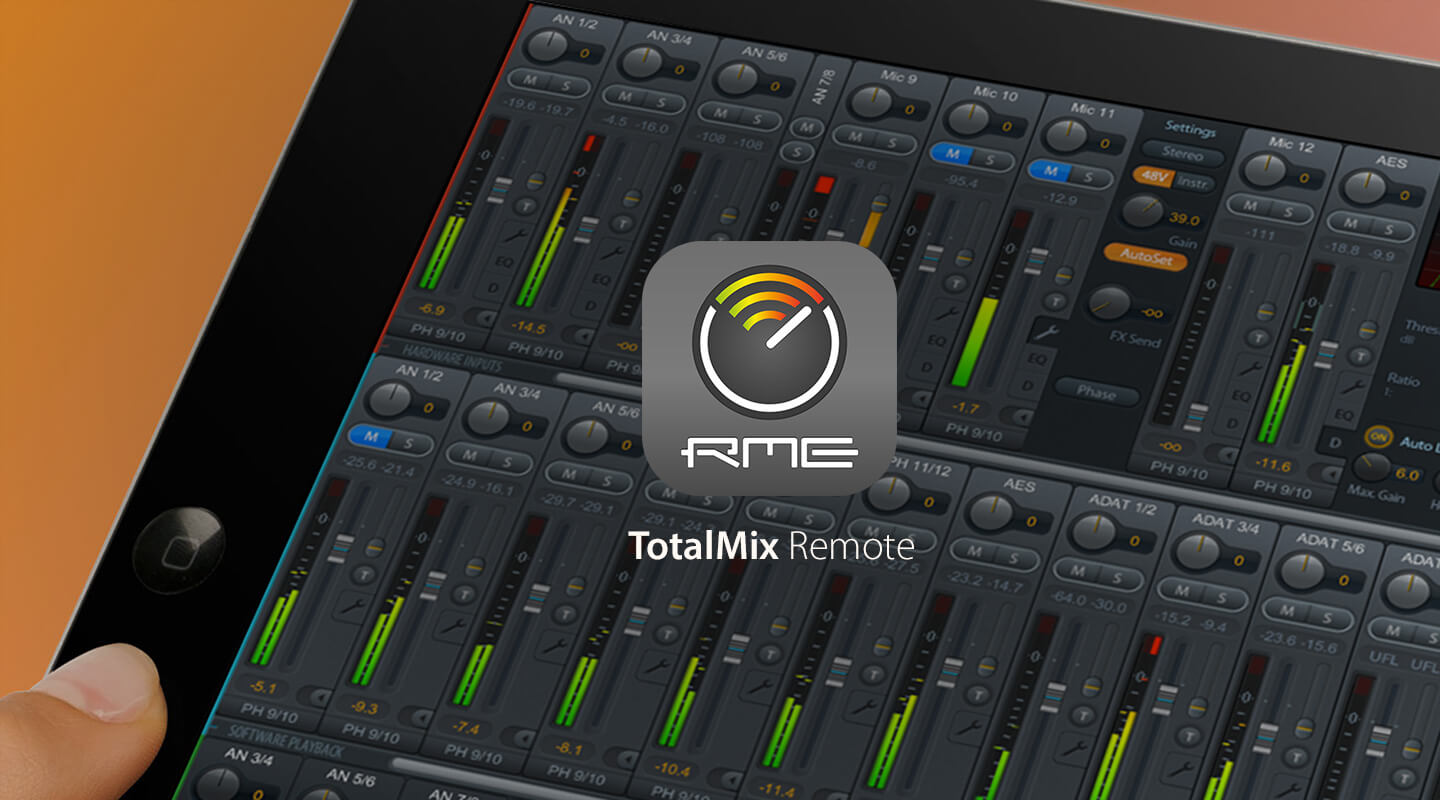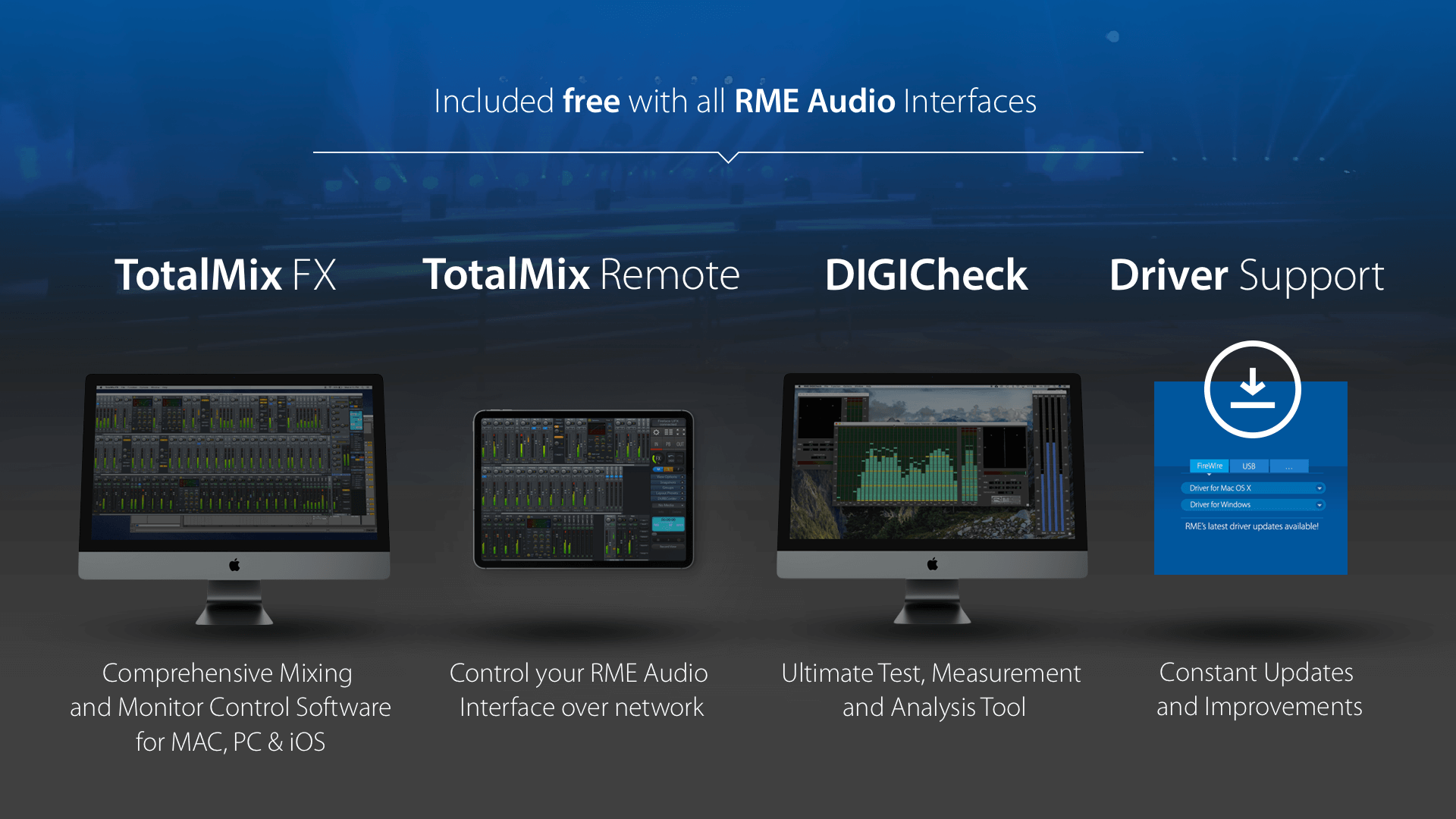Digiface USB
66-Kanal192 kHz USB Audio Interface


Anschlüsse und Features
Merkmale
Das Digiface USB ist ein extrem kompaktes, portables digitales Audio-Interface mit 4 optischen ADAT/SPDIF Ein- und Ausgängen und einem qualitativ hochwertigen analogen Kopfhörer-Ausgang (6,3 mm Klinke). Aufbauend auf dem legendären HDSP Digiface, einem dreifach ADAT I/O Interface mit Kopfhörer- und PCI-Anschluss, vereinfacht das Digiface USB die Verbindung via USB, benötigt kein externes Netzteil, und bringt sogar noch einen weiteren optischen Ein- und Ausgang mit, was bei Nutzung von ADAT optisch 32 Kanäle Eingänge wie Ausgänge ergibt.
Der analoge Ausgang auf den Kanälen 33/34 ist dank TotalMix FX, RMEs Routing- und Monitoring-Software, welche so gut wie keine Einschränkungen in Routing und Mixing aufweist, frei nutzbar (Hinweis: Digiface USB unterstützt keine FX).
Jeder einzelne optische Anschluss kann entweder als ADAT (bis zu 8 Kanäle) oder SPDIF (Stereo) benutzt werden. Während sich die Eingänge automatisch an das eingehende Signal-Format anpassen, können die Ausgänge individuell zwischen ADAT und SPDIF umgeschaltet werden. Unterstützt werden SMUX und SMUX4. Bei 192 kHz sind so 8 Kanäle via 4 x SPDIF oder ADAT jeweils als Ein- und Ausgänge möglich.
Seine geringe Größe und Gewicht, sowie die Stromversorgung über USB, machen das Digiface USB extrem vielseitig einsetzbar. Bis hin zum Einsatz als reiner Kopfhörer-Verstärker im mobilen Einsatz.

TotalMix FX und TotalMix Remote
Wie alle aktuellen RME-Interfaces besitzt auch das Digiface USB den leistungsfähigen digitalen Echtzeit-Mischer TotalMix FX. Er kann quasi beliebige Misch- und Routingvorgänge mit allen Eingängen und Wiedergabespuren auf beliebigen Hardwareausgängen ausführen. Das Digiface USB besitzt aber keinen DSP, daher sind keine Effekte (FX) vorhanden. Trotzdem enthält der Mischer beispielsweise eine Control Room Sektion mit Talkback, Main/Phones, Fadergruppen, Mute-Gruppen, komplette Fernsteuerbarkeit per Mackie- und OSC-Protokoll, und vieles mehr.
TotalMix Remote, erweitert die Leistungsfähigkeit der RME Interfaces, indem es eine Fernsteuerung über iOS, PC oder Mac ermöglicht. Mit einem unkomplizierten Einrichtungsvorgang - Sie geben einfach die IP-Adresse des Computers ein, den Sie mit TotalMix Remote steuern möchten – und sofort kann jeder Aspekt von TotalMix FX auf einem Host-System angepasst werden, während Sie mit dem Tablet durch das Studio laufen, unabhängig davon an welcher Stelle sich der Kontrollraum in Ihrer Einrichtung befindet.

Typische Anwendungsfälle für TotalMix sind:
- Erstellen von verzögerungsfreien Submixen (Kopfhörermischungen). Im Digiface USB lassen sich bis zu 17 vollkommen unabhängige Stereo-Submixes erstellen. Bei einem analogen Mischpult entspräche dies 34 Aux Sends
- Beliebiges Routen der Ein- und Ausgänge (freie Verwendbarkeit, Patchbay-Funktion).
- Verteilen eines Signals auf mehrere Ausgänge gleichzeitig. TotalMix bietet State-of-the-Art Splitter- und Verteilfunktionen.
- Gleichzeitige Wiedergabe verschiedener Programme über nur einen Stereoausgang. Dank ASIO Multiclient Treiber können mehrere Programme gleichzeitig genutzt werden. Erfolgt dies auf verschiedenen Wiedergabekanälen, kann TotalMix diese auf beispielsweise nur einem Stereoausgang zusammenmischen.
- Mischen des Eingangssignales zum Playbacksignal (vollständiges ASIO Direct Monitoring). RME ist nicht nur der Pionier in Sachen ADM, sondern bietet auch die vollständigste Umsetzung der ADM-Funktionen.
- Integration externer Geräte. TotalMix erlaubt ein Einschleifen externer Effektgeräte, im Wiedergabe-und im Aufnahmeweg. Je nach Anwendung entspricht dies einer Insert oder Effekt-Send und Effekt-Return Funktionalität, um beispielsweise beim Echtzeitmonitoring dem Gesang etwas Hall hinzuzufügen.
- Jeder Eingangskanal, Wiedergabekanal und Hardwareausgang besitzt ein in Hardware berechnetes Peak und RMS Level Meter. Diese Pegelanzeigen sind besonders hilfreich, da sie auf einen Blick erkennen lassen, wo derzeit Signale vorhanden sind, und wohin sie geroutet werden.
TotalMix FX -Mixing / Routing mit überragenden Funktionen für Studio und Live Anwendungen
Seit 2001 erweitert TotalMix die Audio-Interfaces von RME um unbegrenztes Routing und Mixing. Seine einzigartige Fähigkeit, so viele unabhängige Submixe zu erstellen, wie Ausgangskanäle zur Verfügung stehen, machte es zum flexibelsten und leistungsfähigsten Mixer seiner Art.
RME USB - Transportieren Sie Audio mit niedrigster Latenz und branchenführender Stabilität
Nutzen Sie Ihr RME Audio Interface auf Mac und PC mit zuverlässigen, stabilen und regelmäßig aktualisierten Treibern für unsere Produkte. RME Audio entwickelt seinen eigenen Interface Kern und ist nicht von Drittanbietern abhängig, wenn es um Upgrades, Modifikationen oder Bugfixes geht, so dass Kunden die neuesten Betriebssysteme ohne Unterbrechung oder Verzögerung nutzen können.
DigiCheck - Die Geheimwaffe für hochauflösende Audiomessverfahren
RMEs einzigartige Software-Toolbox zum Testen, Messen und Analysieren digitaler Audio Signale. 2, 8 oder alle Kanalpegelmesser mit unzähligen Optionen. Spektralanalysator, Goniometer und Bitstatistik in professioneller Qualität.
Kein externes Netzteil erforderlich.
Tech-Specs
Digiface USB
Eingang Optical ADAT / SPDIF
- 4 x TOSLINK, Format nach Alesis-Spezifikation
- SPDIF kompatibel (IEC 60958)
- Standard: 32 Kanäle 24 Bit, maximal 48 kHz
- Double Speed (S/MUX): 16 Kanäle 24 Bit 96 kHz
- Quad Speed (S/MUX4): 8 Kanäle 24 Bit 192 kHz
- Bitclock PLL für perfekte Synchronisation auch im Varispeed-Betrieb
- Lock Range: 31,5 kHz – 50 kHz
- Jitter bei Sync auf Eingangsignal: < 1 ns
Ausgang Optical ADAT / SPDIF
- 4 x TOSLINK, Format nach Alesis-Spezifikation
- SPDIF kompatibel (IEC 60958)
- Standard: 32 Kanäle 24 Bit, maximal 48 kHz
- Double Speed (S/MUX): 16 Kanäle 24 Bit 96 kHz
- Quad Speed (S/MUX4): 8 Kanäle 24 Bit 192 kHz
Ausgang Analog Phones 33/34
- Rauschabstand (DR): 110 dB unbewertet, 113 dBA
- Frequenzgang @ 44,1 kHz, -0,5 dB: 0 Hz - 20,8 kHz
- Frequenzgang @ 96 kHz, -0,5 dB: 0 Hz - 45 kHz
- Frequenzgang @ 192 kHz, -1 dB: 0 Hz - 89 kHz
- THD@-1dBFS:-96dB,0,0016%
- THD+N @ -1 dBFS: -95 dB, 0,0017 %
- Übersprechdämpfung: > 100 dB
Ausgang: 6,3 mm Stereoklinke, unsymmetrisch
- Ausgangsimpedanz: 2 Ohm
- Ausgangspegel bei 0 dBFS, 1 kOhm Last: +9,5 dBu
- Max. Ausgangsleistung @ 0,1% THD: 50 mW
Digital
- Clocks: Intern, ADAT In, SPDIF In
- Low Jitter Design: < 1 ns im PLL Betrieb, alle Eingänge
- Interne Clock: 800 ps Jitter, Random Spread Spectrum
- Jitterunterdrückung bei externer Clock: > 30 dB (2,4 kHz)
- Eingangs-PLL arbeitet selbst mit mehr als 100 ns Jitter ohne Aussetzer
- Unterstützte Samplefrequenzen: 28 kHz bis zu 200 kHz
Allgemeines
- Stromversorgung: USB Bus Power
- Typischer Leistungsbedarf: 1,2 Wat
- Strombedarf bei 5 Volt Bus Power: 230 mA
- Maximaler Leistungsbedarf: unter 2 Watt
- Masse (BxHxT): 128 x 22 x 55 mm
- Gewicht: 220 g
- Temperaturbereich: +5° bis zu +50° Celsius
- Relative Luftfeuchtigkeit: < 75%, nicht kondensierend
Alle Spezifikationen können ohne vorherige Ankündigung geändert werden.
Treiber
Digiface USB
Update to firmware: (* latest change)
MADIface XT: USB 191 PCIe 56 DSP 42
MADIface XT II: USB 3/2 321, DSP 59, CC 11*
MADIface USB: 25 (6), 102 (7)
MADIface Pro: 73
OctaMic XTC: 47/26
ADI-2 Pro series (6): FPGA 267, DSP 128
ADI-2 Pro series (7): FPGA 412, DSP 128
ADI-2 DAC series: FPGA 81, DSP 62
ADI-2/4 Pro SE: FPGA 73, DSP 40
ADI-2/4 Pro SE: FPGA 210, DSP 40
UFX II: USB 26 DSP 28 CC 15 (A), USB 115 DSP 28 CC 112 (E), USB 206 DSP 28 CC 208 (7)
Fireface UFX III: USB 20 DSP 23 CC 44
UFX+: USB 55 DSP 59 Thunderbolt 112 (A), USB 72 DSP 60 Thunderbolt 167 (E)
Digiface USB: 18 (X), 35 (G)
Digiface AVB: 261
Digiface Dante: 57
Digiface Ravenna: 55
Digiface AES: USB 47 MCU 17 CC 11
USB I/O: USB 6, CC 4
Update to version: (*latest changes)
MADIface XT: USB 3/2 191, PCIe 56, DSP 42
MADIface XT II: USB 3/2 321, DSP 59, CC 11*
MADIface USB, Hw Rev 6: 25
MADIface USB, Hw Rev 7: 102
MADIface Pro: 73
OctaMic XTC: USB 47, DSP 26
ADI-2/4 Pro SE: FPGA 72, DSP 40
ADI-2/4 Pro SE: FPGA 210, DSP 40
ADI-2 Pro Series: FPGA 267, DSP 128
ADI-2 Pro Series: FPGA 412, DSP 128
ADI-2 DAC: FPGA 81, DSP 62
Digiface USB, Hw Rev X: 18
Digiface USB, Hw Rev G: 35
Fireface UFX II, Hw Rev A: USB 26, DSP 28, CC 15
Fireface UFX II, Hw Rev E: USB 115, DSP 28, CC 112
Fireface UFX II, Hw Rev 7: USB 206, DSP 28, CC 208
Fireface UFX III: USB 20 DSP 23 CC 44
Digiface Dante: 57
Digiface Ravenna: 55
Digiface AES: USB 47, MCU 17, CC 11
USB I/O: USB 6, CC 4
macOS 11 or up (Big Sur, Monterey, Ventura and up) Check OS Version USB series DriverKit driver, v. 4.18.
Update to version: (*latest changes)
MADIface XT: USB 3/2 191, PCIe 56, DSP 42
MADIface XT II: USB 3/2 321, DSP 59, CC 11*
MADIface USB, Hw Rev 6: 25
MADIface USB, Hw Rev 7: 102
MADIface Pro: 73
OctaMic XTC: USB 47, DSP 26
ADI-2/4 Pro SE: FPGA 72, DSP 40
ADI-2/4 Pro SE: FPGA 210, DSP 40
ADI-2 Pro Series: FPGA 267, DSP 128
ADI-2 Pro Series: FPGA 412, DSP 128
ADI-2 DAC: FPGA 81, DSP 62
Digiface USB, Hw Rev X: 18
Digiface USB, Hw Rev G: 35
Fireface UFX II, Hw Rev A: USB 26, DSP 28, CC 15
Fireface UFX II, Hw Rev E: USB 115, DSP 28, CC 112
Fireface UFX II, Hw Rev 7: USB 206, DSP 28, CC 208
Fireface UFX III: USB 20 DSP 23 CC 44
Digiface Dante: 57
Digiface Ravenna: 55
Digiface AES: USB 47, MCU 17, CC 11
USB I/O: USB 6, CC 4
USB 2/3 Kernel Extension driver for macOS 11 ( Big Sur, Monterey, Ventura and up) Check OS Version. Version 3.33. Supports Intel and Mx.
version 3.223. Compatible to 10.12 (macOS Sierra) up to 10.15 (macOS Catalina) Check OS Version. Mx users please download macOS 11 and up USB Series Driver.
Version 2.23. Compatible to 10.9 (OS X Mavericks) up to 10.13 (macOS High Sierra) Check OS Version. Legacy build, newer drivers are version 3.x. M1 user please download macOS 11 and up USB Series Driver.
Update to firmware: (* latest change)
MADIface XT: USB 191 PCIe 56 DSP 42
MADIface XT II: USB 3/2 321, DSP 59, CC 11*
MADIface USB: 25 (6), 102 (7)
MADIface Pro: 73
OctaMic XTC: 47/26
ADI-2 Pro series (6): FPGA 267, DSP 128
ADI-2 Pro series (7): FPGA 412, DSP 128
ADI-2 DAC series: FPGA 81, DSP 62
ADI-2/4 Pro SE: FPGA 73, DSP 40
ADI-2/4 Pro SE: FPGA 210, DSP 40
UFX II: USB 26 DSP 28 CC 15 (A), USB 115 DSP 28 CC 112 (E), USB 206 DSP 28 CC 208 (7)
Fireface UFX III: USB 20 DSP 23 CC 44
UFX+: USB 55 DSP 59 Thunderbolt 112 (A), USB 72 DSP 60 Thunderbolt 167 (E)
Digiface USB: 18 (X), 35 (G)
Digiface AVB: 261
Digiface Dante: 57
Digiface Ravenna: 55
Digiface AES: USB 47 MCU 17 CC 11
USB I/O: USB 6, CC 4
Driver for Windows 10 / 11, Intel x64 and Arm, version 1.0. Supports Intel Windows 10 or up 64 bit, and Windows 11 Arm systems, with both WDM and ASIO. Updated installer. See readme for details.
Version 0.9845, Windows 8 and up. Last version to support Windows 32 bit.
Driver for Windows 10 / 11, Intel x64 and Arm, version 1.0. Supports Intel Windows 10 or up 64 bit, and Windows 11 Arm systems, with both WDM and ASIO. Updated installer. See readme for details.
Version 0.9845, Windows 8 and up. Last version to support Windows 32 bit.
Version 0.9827, last driver version for Windows 7.
Version 0.9845, Windows 8 and up. Last version to support Windows 32 bit.
TotalMix FX V 1.98 (2). This zip includes only TotalMix FX, to update TotalMix when using older drivers that come with an older TotalMix FX version.
Installation: Exit TotalMix FX completely and copy the app into the Applications folder, overwriting the old file.
TotalMix Remote V 1.43 - App to remote control TotalMix FX via ethernet and WiFi from other devices with Mac OS 10.12 or up. Universal Binary, supports Intel and Mx. Please note: can not be run on the same computer where the host TotalMix FX is used. This download is not TotalMix FX, which is part of the driver installation.
TotalMix FX V 1.98 for Windows, 32 bit version. This zip includes only TotalMix FX, to update TotalMix when using older drivers that come with an older TotalMix FX version.
Installation: Exit TotalMix FX (right click systray icon) and copy the new version into Windows\System32, overwriting the old file.
TotalMix Remote V 1.43 - Program to remote control TotalMix FX via ethernet and WiFi from other devices with Windows OS (PC, Tablet). Please note: can not be run on the same computer where the host TotalMix FX is used. This download is not TotalMix FX, which is part of the driver installation.
TotalMix FX V 1.98 for Windows x64.. This zip includes only TotalMix FX, to update TotalMix when using older drivers that come with an older TotalMix FX version.
Installation: Exit TotalMix FX (right click systray icon) and copy the new version into C:\Prgram Files\RME\Fireface or \MADIface, overwriting the old file. If there is no such directory then you need to use the TotalMix FX 32 bit file.
TotalMix FX V 1.98 for Windows Arm 64 bit. This zip includes only TotalMix FX, to update TotalMix when using older drivers that come with an older TotalMix FX version.
Installation: Exit TotalMix FX (right click systray icon) and copy the new version into C:\Prgram Files\RME\Fireface or \MADIface, overwriting the old file.
TotalMix FX V 1.98 for Windows x64.. This zip includes only TotalMix FX, to update TotalMix when using older drivers that come with an older TotalMix FX version.
Installation: Exit TotalMix FX (right click systray icon) and copy the new version into C:\Prgram Files\RME\Fireface or \MADIface, overwriting the old file. If there is no such directory then you need to use the TotalMix FX 32 bit file.
Universal binary, runs natively on Intel and Mx machines. DigiCheck NG V 0.92 requires macOS 10.13 (High Sierra) or up.
EBU R-128 Meter. Surround Audio Scope with ITU weighting. Stereo / Multichannel / Global Level Meter, Spectral Analyser, Vector Audio Scope, Correlation Meter, Bit Statistic & Noise. In this version a display of plaback data is not possible via Core Audio, only via hardware level. Supports all cards of the HDSPe, FireWire and USB series. (09/14/2018).
Differences to v 4.53: EBU R-128 Meter. Surround Audio Scope with ITU weighting. Simultaneous usage of multiple cards in all functions. Displays fully configurable (e.g. channel selection). Multichannel Level Meter freely configurable. MMCSS for Vista. Many improvements on surface and internal operation. Supports all current interfaces plus DIGI 9636/52. DIGI32 series and DIGI96 series are no longer supported. (10/05/2020).
V596 adds compatibilty for HDSPe MADI FX and XT with DK firmware.
DigiCheck NG V 0.92 requires a Direct3D 12 capable graphics card and Windows 10 or up.
DigiCheck NG V 0.92 requires a Direct3D 12 capable graphics card and Windows 10 or up.
Stereo Level Meter, Multichannel Level Meter, Global Level Meter, Spectral Analyser, Vector Audio Scope, Correlation Meter, Totalyser, Bit Statistic & Noise, Global Record. ASIO support, multi-client operation, display of +dBFS levels, display of playback data, K-system, free reference/scale, third colour. New: Hardware Level Meter. RMS Slow and RLB weighting filter. Optional Correlator. Level meters vertical/horizontal. Presets with hotkeys. Support for Fireface 400, newer Fireface 800 drivers, HDSP series WDM driver. Record functionality Global Record. Compatible to HDSPe PCI and HDSPe MADI/MADIface
Stereo Level Meter, Multichannel Level Meter, Global Level Meter, Spectral Analyser, Vector Audio Scope, Correlation Meter, Totalyser, Bit Statistic & Noise, Global Record. ASIO support, multi-client operation, display of +dBFS levels, display of playback data, K-system, free reference/scale, third colour. New: Hardware Level Meter. RMS Slow and RLB weighting filter. Optional Correlator. Level meters vertical/horizontal. Presets with hotkeys. Support for Fireface 400, newer Fireface 800 drivers, HDSP series WDM driver. Record functionality Global Record. Compatible to HDSPe PCI and HDSPe MADI/MADIface
Handbücher
Digiface USB
Handbuch des Digiface USB, Version 1.1, 07/2018